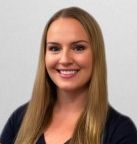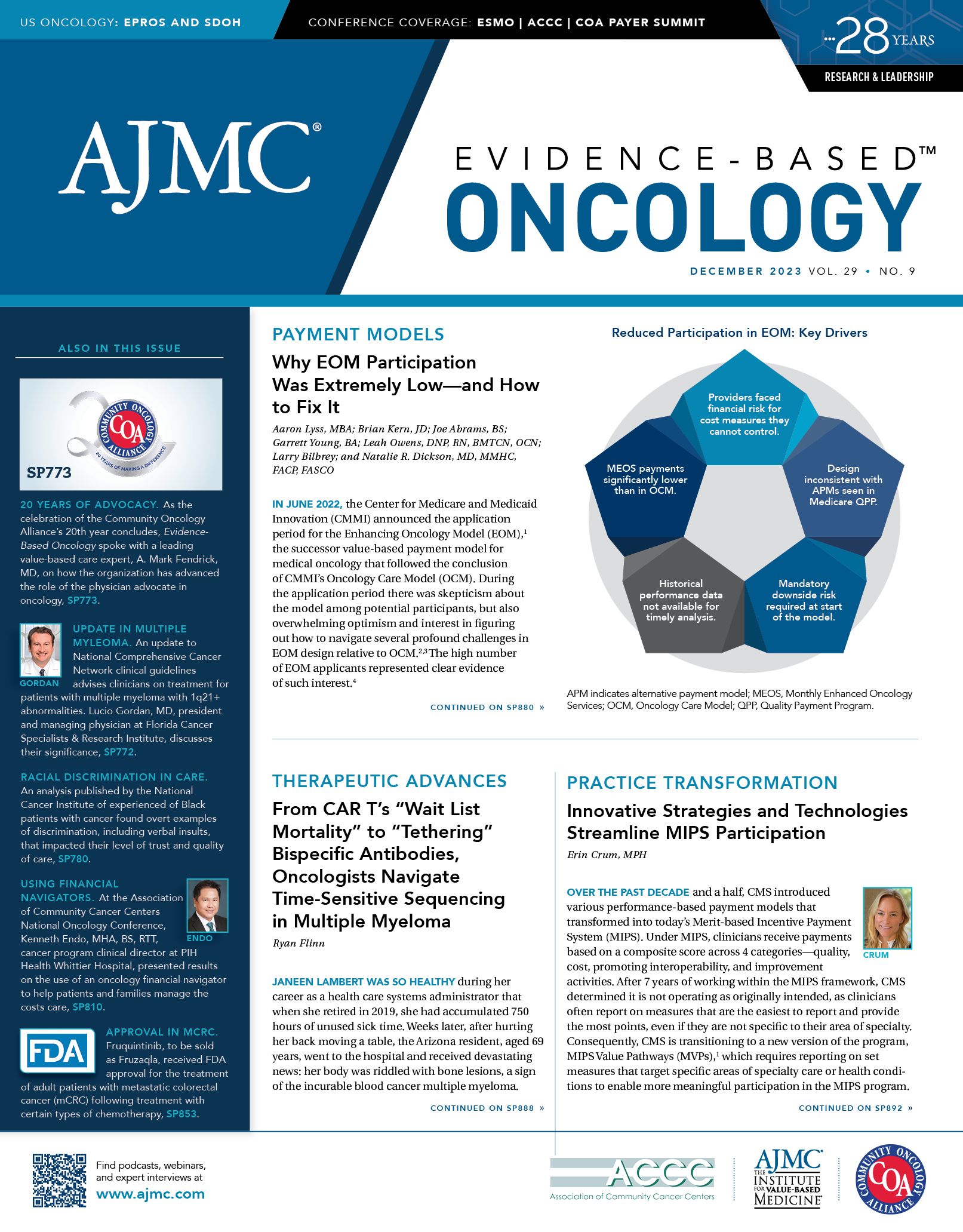- Center on Health Equity & Access
- Clinical
- Health Care Cost
- Health Care Delivery
- Insurance
- Policy
- Technology
- Value-Based Care
Meeting Practices Where They Are on the Road to Change in Cancer Care Delivery
Coverage from The US Oncology Network Payer Transformation Summit, held September 27-29, 2023, in Atlanta, Georgia.
Jessica Neeb, MSN, OCN, director, practice transformation, for McKesson, has worked in academic oncology and for oncology quality programs for payers. “Oncology is my passion,” Neeb told Evidence-
Neeb

Based Oncology (EBO), in describing why she wanted to come back to working with providers. Her new role with McKesson involves helping practices that are at many different points along the road to transformation—from those diving into the Enhancing Oncology Model to those still mastering the Merit-based Incentive Payment System (MIPS), which is converting to MIPS Value Pathways.
This interview has been condensed and edited for clarity.
EBO: How does The US Oncology Network work with practices on transformation?
Neeb: We have the regulatory programs—MIPS and the Advancing Cancer Care MVP, and the Enhancing Oncology Model. We work with practices if they’re participating in commercial programs as well.
Transformation leads are assigned to each network practice; they’re like navigators that help the practices achieve their value-based care goals, no matter what model they’re participating in.
So, we have practices that are just reporting under MIPS, to practices also reporting in the EOM and multiple value-based care contracts with payers. We have a lot of practices participating with accountable care organizations. So, our team really works to understand what the practice strategy and goals are around value-based care, what programs the practices are participating in, and how we can help them with transformation activities to support success in those programs.
EBO: How would you characterize the transformation landscape? Are more practices doing more different models and programs? Are the strategies becoming more robust?
Neeb: I think the strategies are definitely getting more robust and more complex, with the addition of the Advancing Cancer Care MVP, and the Enhancing Oncology Model. There are just a lot of options for practices to participate in value-based care programs. And that leads to greater complexity in how we are going to manage the programs. Do we have the resources in place to support the programs, and really everything that entails?
EBO: Is this because some practices are so much farther ahead in transformation than others? Is it a problem if your practice hasn’t really done much to this point? Can practices catch up, and how do you deal with that?
Neeb: Because of the network model with the transformation leads in place for support, I don’t think it’s a problem. If practices need to catch up, we’re there to help them, and we engage them regularly. So really, because of the network model, which exists to keep practices independent, it’s really their decision what programs they participate in. So, if they just want to do MIPS and their goals lie in other areas, then that’s totally fine. We support them with that. But if they want to do EOM and 4 commercial contracts, we can work with them on that as well. It’s a matter of resource management on our end to figure out which practices are doing which programs, and how we make sure we support them individually based on their goals.
EBO: What’s the most common question practices have had for the last year?
Neeb: Well, EOM was huge. All of our practices evaluated it, except for 1 practice. We encouraged everyone to apply, because there was no risk to applying. So basically, the question of the past year has been, “Is EOM right for my practice?”
We really have worked with each practice in a number of different ways. We immediately set up a structure to be able to communicate information out about EOM: What are the differences with OCM? What are the big initiatives that you need to take on for EOM? So, I think that’s been the big question of the last year, as practices are thinking about what’s going to happen in the next 5 years. Practices ask: Is this going to be mandatory? Eventually should we participate?
EBO: So, even for the practices that went through the process and decided not to move forward with EOM, was that process valuable? Did they come away learning things about their businesses that was helpful on a go forward basis?
Neeb: I think it was incredibly valuable, especially for the practices to receive that baseline data from the government—so that they can understand where their practice was in terms of total cost of care and quality. It was very valuable to get that data and understand how they would have performed, and the model based on those cancer diagnoses. They’re able to use that whether they chose to participate or not moving forward to understand, total cost and value if they’re participating in other value-based care programs. They can use some of that information to focus on areas that looked like they had opportunity.
EBO: How has your experience working for payers been helpful in this role?
Neeb: Every piece of information that you gain in your professional life is helpful. I think that it was a major challenge working with providers from the payer side. So, it’s more comfortable here where it’s the network supporting network practices. There are a lot of misconceptions about who’s doing what and why there are barriers when things are not covered. Many times, providers think, “You know, the payer just won’t do this,” and it’s really a lack of experience on their side or the ability to get the data that they need. From my perspective, there’s definitely a win-win-win situation in oncology when the payer, the provider, pharma, and the patient can agree. I think it’s all about collaboration and relationship building in those areas to get to that.

Oncology Onward: A Conversation With Dr Debra Patt of Texas Oncology
August 1st 2023Debra Patt, MD, PhD, MBA, joins hosts Emeline Aviki, MD, MBA, and Stephen Schleicher, MD, MBA, for episode 2 of our newest podcast, "Oncology Onward: Conversations With Innovators and Changemakers in Cancer Care."
Listen
